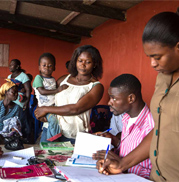 Cervical cancer now kills as many women as childbirth, claiming a life every two minutes in some countries. Some 275,000 women in the world die of cervical cancer every year: more than 85% in low-income countries, where infections are higher and fewer women have access to screening and treatment. Without changes in prevention and control, cervical cancer deaths are expected to increase to 430,000 each year by 2030, virtually all in developing countries.
Cervical cancer now kills as many women as childbirth, claiming a life every two minutes in some countries. Some 275,000 women in the world die of cervical cancer every year: more than 85% in low-income countries, where infections are higher and fewer women have access to screening and treatment. Without changes in prevention and control, cervical cancer deaths are expected to increase to 430,000 each year by 2030, virtually all in developing countries.
One of the next decade’s main global health challenges will be non-communicable diseases and more specifically cancer. Vaccines play a critical role in preventing the infections that cause certain cancers like liver and cervical cancers. The prevention of the infectious causes of cancer through hepatitis B and human papillomavirus (HPV) vaccines can help fight the rising global burden of cancer deaths.
Since 2001, the GAVI Alliance has supported the immunisation of 360 million infants against hepatitis B in the poorest countries of the world. My own country Ghana recently started to protect girls against cervical cancer with GAVI-supported HPV vaccines.
Sweden hosted GAVI’s Mid-Term Review a few weeks ago where the Alliance’s key results were highlighted: the Alliance is on course to reach its mission target of immunising an additional 243 million children between 2011 and 2015. By 2014, all 73 GAVI-supported countries will have introduced the 5-in-1 pentavalent vaccine, including Haiti, Myanmar, Somalia and South Sudan.
This work would not have been possible without The European Union. The GAVI Alliance and the European Institutions have worked hand-in-hand to ensure leadership in global health issues and help achieve MDG 4. From 2003 to 2012, the European Institutions have contributed to financing vaccines introductions in GAVI-eligible African Caribbean Pacific (ACP) states with other donors. Moreover, 10 European Union member states are GAVI donors, seven of which are among the top 10 GAVI donors. Most of them provide long-term predictable funding, thereby enabling effective market shaping and sustainable routine immunisation programmes in the ACP and beyond.
I would like to thank the European Union at large for its major contribution and I am pleased to see the impact on the ground of taxpayers’ euros. Vaccines offer a giant step forward in the prevention of cancer caused by infectious agents. A new development agenda cannot be built without immunisation that leads to a healthy future for all nations.




